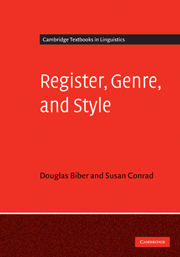Book contents
- Frontmatter
- Contents
- Acknowledgements
- 1 Registers, genres, and styles: fundamental varieties of language
- PART I Analytical framework
- Part II Detailed descriptions of registers, genres, and styles
- PART III Larger theoretical issues
- 8 Multidimensional patterns of register variation
- 9 Register studies in context
- Appendix A Annotation of major register/genre studies (by Federica Barbieri)
- Appendix B Activity texts
- References
- Index
9 - Register studies in context
Published online by Cambridge University Press: 05 June 2012
- Frontmatter
- Contents
- Acknowledgements
- 1 Registers, genres, and styles: fundamental varieties of language
- PART I Analytical framework
- Part II Detailed descriptions of registers, genres, and styles
- PART III Larger theoretical issues
- 8 Multidimensional patterns of register variation
- 9 Register studies in context
- Appendix A Annotation of major register/genre studies (by Federica Barbieri)
- Appendix B Activity texts
- References
- Index
Summary
The preceding chapters have introduced the concept of register in relation to the related concepts of genre and style. These chapters have additionally described a framework for doing register analysis, presented several case studies that have applied this framework, and discussed research findings on the more general patterns of register variation and historical change. In the present chapter, we return to some of the themes introduced in Chapter 1, discussing the place of register studies in relation to other academic fields and in relation to real-world applications.
Register studies in the broader context of linguistics
It is possible to consider linguistics as comprising two major subfields: the study of language structure (e.g., phonology, morphology, grammar) and the study of language use, how people acquire language and what they actually do with the structural resources of a language. The study of language use is intimately connected to the study of linguistic variation. All human languages exhibit linguistic variation: related linguistic structures that express similar meanings. Variation exists at all linguistic levels, including: allophones (e.g., t vs. th), synonymous words (e.g., dresser vs. chest of drawers), morphemes (e.g., -tion vs. -ment), grammatical constructions (e.g., relative clauses with and without a relative pronoun, active voice vs. passive voice). In large part, the study of language use is the study of linguistic variation, investigating the question of why a speaker uses one set of linguistic forms rather than another at any given time and place.
- Type
- Chapter
- Information
- Register, Genre, and Style , pp. 253 - 270Publisher: Cambridge University PressPrint publication year: 2009



